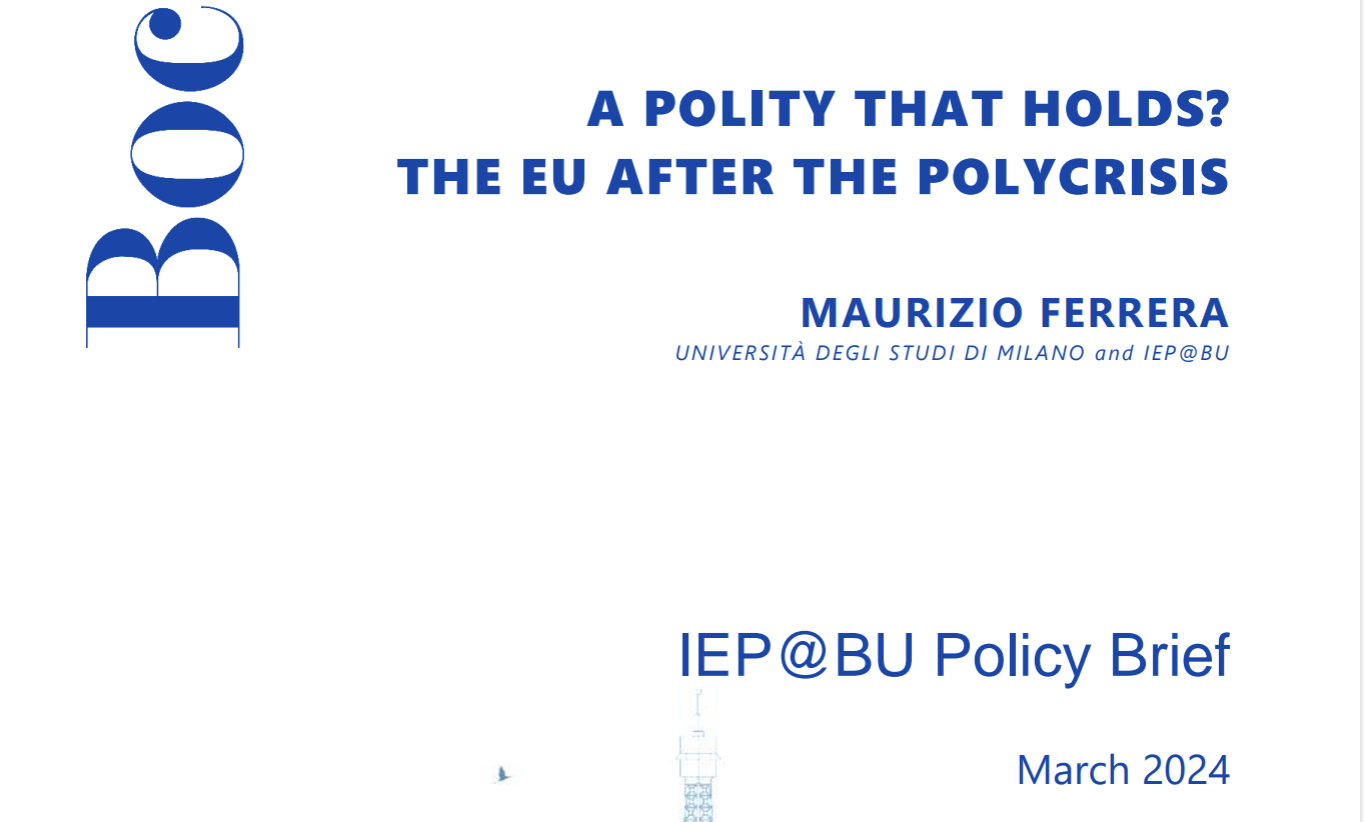Policy Brief n.11 - A polity that holds? The EU after the polycrisis
The polls for the forthcoming European Parliament elections indicate a further surge of the radical and/or sovereigntist right. This result might destabilize again traditional partisan and inter-institutional equilibria and weaken the support to EU authority at a time when serious challenges and difficult choices loom large. Does the EU risk plunging back into an “existential crisis”, as it happened a decade ago in the aftermath of the 2014 elections?

-
File
The polls for the forthcoming European Parliament elections indicate a further surge of the radical and/or sovereigntist right. This result might destabilize again traditional partisan and inter-institutional equilibria and weaken the support to EU authority at a time when serious challenges and difficult choices loom large.
Does the EU risk plunging back into an “existential crisis”, as it happened a decade ago in the aftermath of the 2014 elections?
The risk should not be overrated. During the last decade, the institutional structure of the EU has changed, new shocks and challenges were overcome, and lessons have been learned. To some extent, even Eurosceptic parties have revised their platforms, their very stance vis-à-vis the EU as such.
The EU seems to have gained more resilience, and a greater aptness in weathering the impact of electoral swings and severe endogenous or exogenous shocks. How exactly can we capture the capacity for endurance of a large and complex political structure such as the EU?
To answer this question we must shift the focus from the policy to the polity level: a distinction commonly used in political science.
The first concept connotes a purposive course of programmatic action in a given domain, while the latter connotes the underlying space of interaction which sets basic constraints and opportunities for policy-making as well as its territorial reach.
The EU can be considered a novel type of political meta-space: a compound polity of nation-states.
Like every polity, the Union has drawn boundaries that define it against the outside and has developed a legal system that serves as the ultimate “law of the land” in many domains.
The EU polity is recognizable as a distinctive community in addition to those of its members. It is compound since it is a decentralized, often fragmented political system. Its constituent units are nation-states – i.e. those robust and cohesive political entities which resulted from the long-term process of state-building.
Compared to other historical “coming together” federations like the US or Switzerland, the EU is (still) constantly facing a political master tension between the goal of self-consolidation and stabilization as a meta-polity, on one hand, and the risk of undermining the staying power of domestic polities, on the other.
Political endurance cannot be evaluated based on the classical metric that applies to the state model (exclusive sovereignty, executive autonomy, coercive enforcement, and so on).
In the EU, the advantages of “weak” and “strong”, “open” and “close”, “soft” and “hard” instruments of governance are context specific.
Especially in the hard times of crisis, polity maintenance may require counter-intuitive steps: loosening boundaries instead of guarding their closure (as in the case of Brexit), exploiting the advantages of a weak center instead of strengthening it (as in the management of the pandemic), preserving social cohesion “by stealth” instead of through visible redistributive mechanisms (as was the case during the eurocrisis) and, last but not least, engaging in extraordinary efforts of discursive legitimation to mobilize polity support (the creation of the NGEU).
There is no guarantee that what matters and works for polity maintenance (the survival of the Union as an encompassing political structure) can also bring about clear and immediate advantages in terms of functional performance.
Performance plays of course a key role in polity consolidation and legitimation and is, after all, the point and purpose of integration. In the long run, performance and resilience reinforce each other.
Existential endurance requires however to be constantly monitored per se and its imperatives sometimes deserve political priority over performance optimization, especially in the presence of polity backlashes – such as the rise of Euroscepticism and anti-EU opposition.
Against the odds, the smart re-calibration of boundaries, authority, and social sharing arrangements during the polycrisis as well as the increase of institutional capacities have put in place some “cogs” that restrain reversibility and thus the margins for instability. But self-complacency has to be avoided.
The very success of maintenance operations may erode polity consciousness or reduce its ambitions. Political leaders may then become blind to “policy drift”: instead of keeping the newly created maintenance resources, they can let them waste away or terminate (it has already happened with SURE), with the misconceived goal of “getting back to normal”.
In this light, the June 2024 elections acquire a particular significance. To what extent “polity consciousness” has been fully internalized not only by mainstream parties but also by right-wing nationalist leaders?
Will the new parliamentary majority preserve the “ethic of maintenance” which safeguards polity resilience, as a prerequisite for policy performance? The last (long) decade has taught that this ethic does pay off. But only as long as it lasts.
IEP@BU does not express opinions of its own. The opinions expressed in this publication are those of the authors. Any errors or omissions are the responsibility of the authors.
